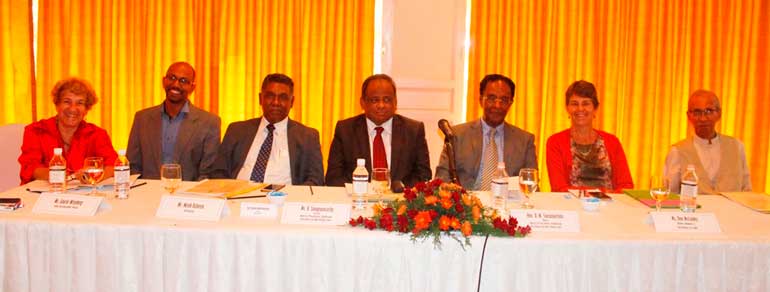Saturday Feb 21, 2026
Saturday Feb 21, 2026
Thursday, 24 March 2016 00:00 - - {{hitsCtrl.values.hits}}
 The Ministry of Prison Reforms, Rehabilitation, Resettlement and Hindu Religious Affairs has initiated action to formulate a comprehensive national policy on durable solutions for conflict affected displacement. This initiative has been technically supported by the United Nations and the UN agencies.
The Ministry of Prison Reforms, Rehabilitation, Resettlement and Hindu Religious Affairs has initiated action to formulate a comprehensive national policy on durable solutions for conflict affected displacement. This initiative has been technically supported by the United Nations and the UN agencies.
A consultation workshop was held at the Taj Samudra Hotel on 21 March to discuss the guiding principles and contents of the draft policy including institutional arrangement for implementation of the policy with monitoring and evaluation mechanism.
D.M. Swaminathan, Minister of Prison Reforms, Rehabilitation, Resettlement and Hindu Religious Affairs was the Chief Guest with Una McCauley, UN Resident Representative. Bradman Weerakoon, Advisor to the Ministry, Secretary, Ministry of Defence, Secretary, Ministry of Foreign Affairs, district secretaries, national, provincial and district senior government officials also participated in this workshop.
This draft policy framework was developed based on wider consultations with national and provincial Government ministries and institutions, development partners, civil society, private sector representatives and conflict affected communities, said V. Sivagnanasothy, Secretary, Ministry of Prison Reforms, Rehabilitation, Resettlement and Hindu Religious Affairs.
The draft policy has drawn the recommendations of the LLRC and other relevant studies, international best practices and other relevant country experiences including UN guiding principles on internal displacement and durable solution framework.
One of the important guiding principles of the policy framework is to find durable solutions to conflict affected communities irrespective of their race, language, religion, gender or ethnicity, said Sivagnanasothy.
The guiding principles also recognise that the IDPs and refugee returnees have the right to return to their places of original lawful residence or an agreed alternative location. The principle also believes the five point strategy (5R) which includes provision of relief, rehabilitation, resettlement, reconstruction and reconciliation. The principle also recognises the need to understand the urgency of the humanitarian assistance and accelerating the resettlement activities and durable solutions.
Swaminathan emphasised in his keynote address that durable solutions go beyond the resettlement and address livelihood, employment, healing, trauma and social harmony. The policy aims to address immediate, medium-term and long-term needs of the IDPs and refugee returnees to create a sustainable reconciliation process.
The draft policy also recognises that the durable solutions should safeguard the rights and wellbeing of the conflict affected families and allow them to rebuild their lives in dignity and peace. The policy also focuses on encouraging voluntary repatriation (not imposed) that helps refugees to return home and get them locally and socially integrated. The lessons learn from the Australian experience on indigenous aboriginal community by the senior team of officials was also contextualised and factored into the policy with other international country experiences, said V. Sivagnanasothy.
The policy provides conflict affected families with legal and physical protection; access to civil, political, economical, social and cultural rights with access to vocational training, health, education and employment.
The draft policy also recognises protracted displacements (old IDPs and refugee returnees) whose needs and requirements were only partially addressed and neglected need to be covered through program intervention. The discussions also expressed that neglecting protracted IDPs (old IDPs and refugee returnees) and second generation of the conflict affected communities – who suffered 30 years of conflict – will be counterproductive. Therefore, it was discussed that a wider perspective of viewing IDPs and refugee returnees is fundamental for durable solutions.
The policy also gives special consideration for displaced in welfare camps, support for single women headed families, support for families with missing persons or disappearances, families with disabilities due to conflict, refugee returnees and protracted IDPs whose needs have not been fully met in the past.
The draft national policy framework on durable solutions will set directions and road map to focus on the short, medium and long term priorities of the IDPs and refugee returnees to ensure rehabilitation, peace building, reconciliation and social harmony are at the centre of the national planning, budgeting, resource mobilisation and program implementation process, said Sivagnanasothy.
Such policy framework will help sectoral line ministries and agencies at the national and sub national level to work collectively with donors and civil societies in the rehabilitation, peace building and national reconciliation process. These inter-ministerial and inter-agency partnership will help to draw the focus of all agencies towards a national thrust area of rehabilitation, peace building and reconciliation.
The policy document was requested by the President and Prime Minister at a national steering committee meeting. The formulation of this policy will provide a clear road map and the commitment of the government in the peace building and reconciliation process and give a message to the local and global community of the priorities of the Government in the short, medium and long-term. Moreover, monitoring mechanism proposed also helps to track the implementation progress and the achievement of results through outcome based key performance indicators.
The Government’s commitment has been demonstrated through the allocation of substantial budgetary provisions in 2016 for rehabilitation and resettlement activities. This draft policy is being further consulted before finalisation and will be submitted to the policymakers at the national and sub national level to get their views, concurrence and endorsement.